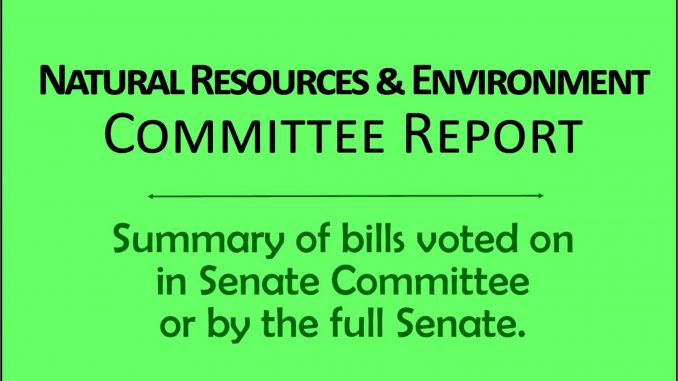
The following bills were passed by the Legislature and signed into law by the Governor.
SF 257 – Issuing permits for bass fishing events
SF 472 – Operation of snowmobiles on public land
HF 202 – DNR Code cleanup: Solid waste management systems program, beautification grants
HF 254 – Tagging requirements for deer carcasses
HF 475 – Use of a straight wall cartridge rifle for the hunting of deer
HF 511 – Administration of state forest nursery
SF 257 establishes Department of Natural Resources guidelines for bass fishing tournaments and permitting for the events. The minimum number of vessels for an event is six on public waters other than the Mississippi River. For Mississippi River events, the minimum number of vessels is 20, and there must be at least 40 participants. The Natural Resource Commission will adopt rules, including:
- Establishing permit requirements for the event, including the weigh-in, handling and release of live bass.
- Measuring and releasing bass from the vessel.
- Number of bass allowed to be kept, and number of bass being kept alive during the tournament.
- Cleaning of vessels after the event to prevent the spread of invasive aquatic species.
[3/1: 50-0]
SF 472 makes changes to the operation of snowmobiles on highways and roadways. Previously, the portion of highways and roadways between a fence line and the traveled area of the road were considered public right of way that could be used by snowmobiles. On some secondary roads, the property line extends to the center of the road, meaning the area between the fence line and the traveled portion of the road is not a public right of way. The bill clarifies that snowmobiles may operate on all areas between a fence line and the traveled portion of the road.
The Department of Natural Resources (DNR) must transfer at least 70 percent of the fees collected in the snowmobile trust fund to local groups for their activities and trail development. Previously, DNR sent at least 50 percent of the fees to local groups. The bill also allows DNR to donate trail grooming equipment to local organizations after it has reached the end of its useful life for the department.
[3/13: 49-0 (Bertrand absent)]
HF 202 updates responsibilities at the Iowa Department of Natural Resources. It removes language regarding funding for beautification grants since the program is now housed within the Economic Development Authority. It also makes changes to the Solid Waste Environmental Management Systems, including eliminating the associated advisory council and updating terminology to reflect current operations.
[4/3: 49-0 (Bertrand absent)]
HF 254 allows a harvested deer to be removed from an obstruction, entanglement or other area prior to attaching the required tag if the situation presents a safety hazard to the hunter or another person. This provision does not allow the hunter to remove the harvested deer from the immediate area or to transport the deer before attaching the required tag.
[4/6: 49-0 (Bertrand absent)]
HF 475 allows the use of a straight wall cartridge rifle to hunt deer. Straight wall cartridge rifles would only use ammunition currently allowed for handguns that are approved for hunting deer, which must be .357 in caliber or larger and have a straight wall cartridge. Straight wall cartridge rifles have the same range as a deer slug shot, but with less recoil. These weapons are also considered to be more accurate than handguns. They cannot be used during archery season, but may be used by those with a permit for the designated youth and disabled season, as well as the first and second shotgun seasons. This does not allow use of high-powered rifles, which have a much greater range.
[4/3: 49-0 (Bertrand absent)]
HF 511 allows the Department of Natural Resources to establish minimum ordering quantities and pricing for plant material sold by the State Forest Nursery. The director must conduct an annual review of market conditions, revenues and expenditures prior to changing prices and ordering quantities. The nursery may sell bare-root stock to private nurseries for resale. These changes are necessary because the nursery operates under a number of constraints regarding the products it may sell and type of sales it may make. Its products are mostly used as a forest management and planning tool, or for conservation efforts by private landowners. In addition, the State Forest Nursery must be financially self-sustaining, should not be supplemented by state funding and cannot operate at a profit.
[4/6: 49-0 (Bertrand absent)]
